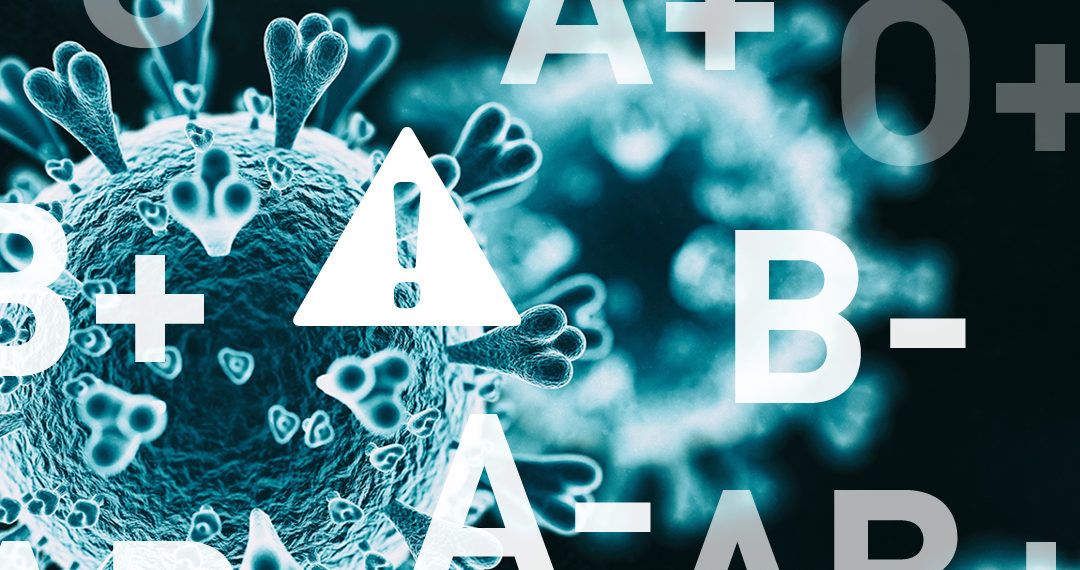
The COVID-19 pandemic has changed the landscape of everyday life for us all. The enormous burden faced by our medical, social, and economic systems has been staggering, and cases continue to rise around the world. As we look towards recovery, there is an urgent need to understand why some people get extremely sick from the virus, while others do not.
 At the Bloodworks Research Institute, Dr. Jill Johnsen and her team are investigating a risk factor you might not expect: your blood type.
At the Bloodworks Research Institute, Dr. Jill Johnsen and her team are investigating a risk factor you might not expect: your blood type.
Reports from China in early March noted that people with blood type A were more likely to be hospitalized with COVID-19 – and die from it – than patients with other blood types. Cases in the US and Europe revealed similar trends. As Dr. Johnsen notes, this connection isn’t surprising to hematology experts: ABO blood type is already a known risk factor for susceptibility to other infections, including the closely-related virus that causes SARS.
In her current research, Dr. Johnsen seeks to answer another critical question: How does your blood type change your susceptibility to severe COVID-19 infection?
The ABO blood group, a complex carbohydrate blood group system, is designated by the four main blood types you are likely familiar with: A, B, AB, and O. Dr. Johnsen and her team at Bloodworks, together with scientists at the University of Washington, have been studying the ABO blood group system for many years. Long before the COVID-19 pandemic, they developed BloodSeq, a sophisticated genetic tool for mapping an individual’s blood in granular detail.
This tool will be key to understanding the role of blood type in COVID-19 infections because human blood is much more complicated than A, B, AB, or O alone.
“While the four main types are what we use to ensure a compatible blood transfusion,” Dr. Johnsen explains, “the nuances within the different types are likely what matter when it comes to infection.”
This summer at Bloodworks, Dr. Johnsen and her team will begin to characterize the ABO blood group in patients who have recovered from COVID-19. Through convalescent plasma donor screening programs and new collaborations with infectious disease experts at UW, our researchers have access to samples from recovered COVID-19 patients, as well as valuable data about the severity of their infection.
Dr. Johnsen will use BloodSeq to assign ABO blood group at a high level of detail, improving our power to detect the effects of ABO expression patterns on COVID-19 severity and begin to get answers on why COVID-19 might hit some patients more severely than others.
If Dr. Johnsen’s research confirms that blood type is a risk factor for severe COVID-19 infection, the implications will be vast. It will allow doctors to better triage individuals when they first get sick, and can be used to improve scientific models of the spread of the disease. Combined with other known risk factors like age, biological sex, and preexisting medical conditions, this information will enable better-informed care decisions based on personal risk level.
Ultimately, research like Bloodworks’ own Dr. Jill Johnsen’s will aid in better understanding how and why people get sick with COVID-19, and help with the development of effective treatments and vaccines that will be critical for our long-term recovery from this global pandemic.
To learn more about Dr. Johnsen’s COVID-19 research, check out the latest episode of Bloodworks 101.
Generous support from the Ellen Browning Scripps Foundation has provided the critical resources needed to jump-start Dr. Johnsen’s research. To join the Foundation in supporting COVID-19 research at Bloodworks, please consider giving a financial gift today.
Tell Us What You Think!